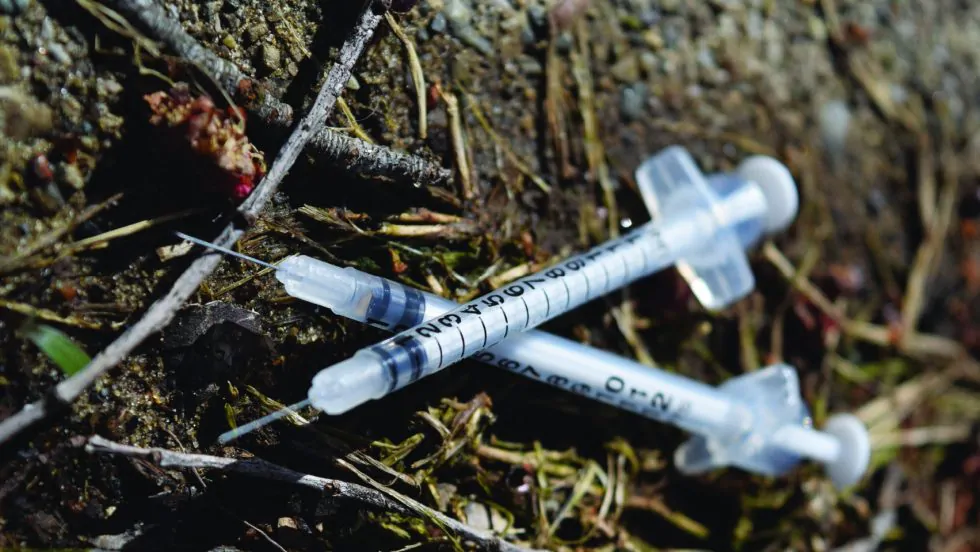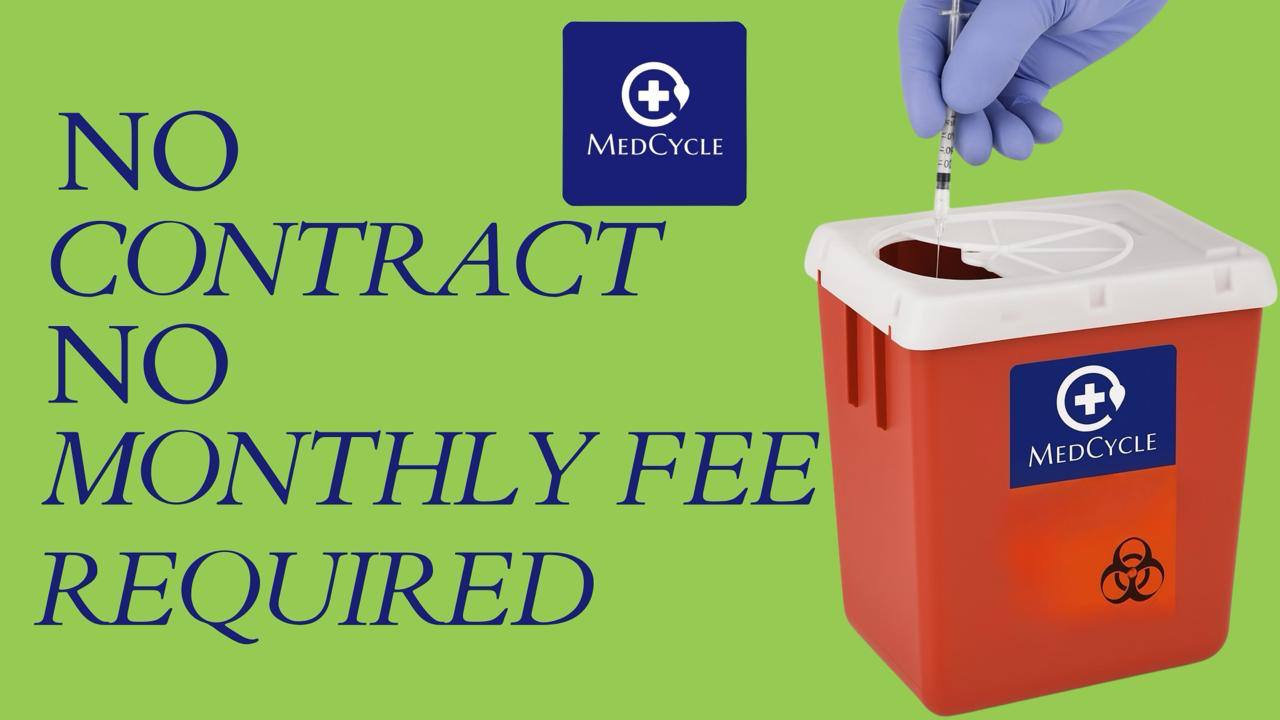If you work for an industry that handles medical waste, or if you aren’t sure whether the waste that you handle is considered medical waste, you may be wondering what the fines for improper disposal of medical waste are. Before we explain the penalties for improperly disposing of medical waste, it’s crucial to know what is considered medical waste and how to properly dispose of it.
This blog explains the different kinds of medical waste, methods for its proper disposal, and what might happen if you improperly dispose of medical waste.
What is Medical Waste?
According to the United States Environmental Protection Agency (EPA), medical waste is “healthcare waste [that] may be contaminated by blood, bodily fluids[,] or other potentially infectious materials.”
While this statement is true, it’s important to know that medical waste is not limited to the healthcare industry. Any facility that produces waste that has been contaminated is responsible for the safe disposal of its medical waste. These facilities include tattoo parlors, veterinary clinics, and funeral homes.
Also, medical waste is not limited to waste contaminated by bodily fluids. Sharps and medical records fall under the medical waste umbrella, and there are specific protocols for their disposal as well.
What is Improper Disposal?
To define improper disposal, it’s best to start with what constitutes proper disposal of medical waste. There are specific guidelines for both the handling and disposing of all kinds of medical waste. Below, we’ll explain the dos and don’ts of medical waste disposal.
Hazardous Waste
Hazardous waste is a form of medical waste that is capable of harming the health of humans, animals, and the environment. Although the EPA restricts its definition to solid waste, there are forms of liquid waste that can be hazardous, such as large quantities of infected blood.
There are few specific guidelines for the storage and disposal of regulated medical waste or hazardous waste. Most organizations, such as the World Health Administration (WHO), simply state that the waste should be disposed of in color-coded and leak-proof containers. That being said, there are a number of state and local regulations that go into more detail about the requirements, and they may be different on a city-to-city basis. Because it can get confusing, it is best to go with a medical waste disposal company, as they will be well-versed in the requirements and can take the stress off of your shoulders.
Although the specifications may differ depending on where you live, it is clear that tossing out hazardous waste with regular trash or littering hazardous waste in any way is improper disposal. Read up on the specific guidelines for your locale to ensure that you are following all rules and regulations.
Sharps
Sharps waste is a form of medical waste that consists of anything that can cut, prick, puncture, or otherwise penetrate the skin, storage units, or waste bags. Not only is this waste dangerous because of the potential physical injuries it may cause, but sharps waste is often contaminated with bodily fluids or other liquids that may infect humans or animals that come in contact with them.
There are specific sharps disposal containers that are approved by the FDA to ensure safe handling. These containers should be leak- and puncture-proof and should have openings that prevent contents from spilling out or being otherwise removed from the container. The containers should also be color-coded to clearly indicate that they contain hazardous waste. Once sharps have been secured, it is crucial to take the container to an Occupational Safety and Health Administration (OSHA)-approved facility. Most often, typical pharmacies like Walgreens and CVS are not approved or equipped to handle sharps waste, so it’s important to find a medical waste disposal company or service to take care of it for you.
Any method of sharps waste disposal that may lead to someone being injured or infected by sharps is improper disposal. Even if you do properly contain the sharps, failing to take that container to an approved facility is also considered improper disposal.
Medical Records
Proper disposal of medical records is a bit different. The biggest danger that comes from the improper disposal of medical records is the possibility of someone’s confidential medical or personal information being released to the public. Medical records contain information called protected health information, which includes birthdates, social security numbers, and physical addresses.
To ensure that this information is protected, the Health Insurance Portability and Accountability Act (HIPAA) mandates that any documents containing this information must be made “unreadable, indecipherable, and otherwise unable to be reconstructed.”
While there isn’t one specific way that these records must be destroyed, the most popular method for disposal is shredding. However, it is best to use an industrial shredder to ensure that all information is adequately indecipherable. Mobile shredding companies are a convenient option for many producers of medical record waste, as they can come to the waste site and shred records on- or off-site.
Ultimately, any method of disposal that fails to destroy protected health information is improper disposal. For more information on mobile shredding companies and regulations for medical record storage and disposal, read our previous blog.
What Are the Effects of Improper Disposal?
Improper disposal of any form of medical waste may lead to physical harm to humans and animals or emotional or financial harm to people whose information has been shared. There are also often environmental effects of improper disposal of medical waste, such as dangerous chemicals leaking into groundwater or wildlife being infected or contaminated.
Who Determines Whether Disposal is Improper?
Despite common beliefs, OSHA is not responsible for defining proper disposal; it simply provides guidelines for the safe storage of waste because of the dangers that improper storage presents to workers in a number of industries. In fact, many government agencies are in charge of guidelines for proper waste disposal, including the EPA and the Department of Transportation (DOT).
As we mentioned above, this responsibility is not limited to the federal government. Each state and many local agencies have specific rules and regulations for waste disposal, which means that different agencies determine the consequences of improper disposal.
Fines and Consequences for Improper Disposal
State Fines and Penalties
Because the fines for improper disposal of medical waste are different for each state, the following should be taken as an example. These fines come from the Texas Health and Safety Code, and each category is separated into individual and corporate fines. Each consequence is contingent upon the fact that the person responsible has acted intentionally or acted despite knowing the improper nature of their conduct.
It is also important to note that these fines are not all-encompassing. There are many enhancements to the fines depending on the severity of the crime.
Small and Large Quantities of Waste
Fines can depend on the quantity of waste that is improperly disposed of. For small quantities, defined in Texas as under 50 pounds, individuals can be fined $1,000 to $50,000 and serve up to 180 days in jail for medical waste, and they can be fined up to $1,000 for paper waste. Corporations can be fined between $1,000 to $100,000 for medical waste and $1,000 to $50,000 for paper waste.
For large quantities of waste—over 50 pounds—individuals can be fined $1,000 to $50,000 and serve up to 10 years of confinement for both medical and medical paper waste. Corporations can be fined between $1,000 to $100,000 for both medical and medical paper waste.
Transportation of Waste
For transporting medical waste to a facility without a permit or manifest, individuals face a $1,000 to $50,000 fine and one year of confinement. Corporations face a $2,000 to $500,000 fine. The fines and penalties are the same for the transportation of medical waste in a vehicle that violates any rules and regulations about medical waste transportation.
False Statements about Waste
For making a false statement or omitting information about the disposal of medical waste, individuals face a fine of $1,000 to $50,000 and one year of confinement. Corporations face a fine of $1,000 to $50,000.
Medical Waste Disposal and Endangerment
If the improper disposal of medical waste places someone in danger of death or serious bodily injury, individuals face a $2,000 to $500,000 fine and 15 years of confinement. Corporations face a $5,000 to $1,000,000 fine.
Waste Disposal into the Environment
If the improper disposal of medical waste includes releasing the waste into the environment, especially if this release leads to the endangerment of another person, individuals face a $1,000 to $250,000 fine and 10 years of confinement. Corporations face a $2,000 to $500,000 fine.
Waste Disposal Services in Texas
As you can see, there are many ways to violate medical waste disposal rules and regulations. While it is possible to properly dispose of medical waste on your own, the easiest way to ensure that medical waste is properly disposed of is to partner with a medical waste management company that is trained and licensed in handling medical waste and disposing of it properly.
MedCycle LLC provides medical waste disposal services to many waste-generating industries in Texas, including Houston, Dallas, Austin, and San Antonio. Our waste collection, transportation, treatment, and disposal services are safe and cost-effective. We can save you valuable time and resources—and help you avoid criminal or civil penalties—by streamlining and managing the waste requirements of your facilities. Contact us today to get a free quote and see how MedCycle can help you with all of your medical waste disposal needs.




